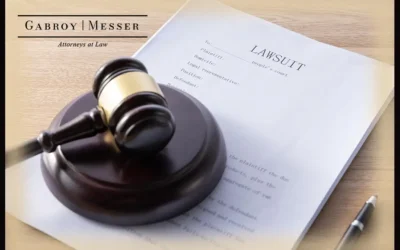Wrongful Termination
Although many people believe that their termination was wrongful termination because it was unfair, it is not enough to make it wrongful. In order to consider suing for wrongful termination, the termination must fit into certain guidelines. Nevada’s “at-will” employment laws allow employers to terminate an employee for any reason. Employees also have the option to quit any time they choose. In most cases, wrongful termination occurs only if one of these exceptions applies.
- Contract: An employer and employee must agree to abide by a written contract. While most employees haven’t signed a contract that specifies a time or other terms, they may be bound by a collective bargaining arrangement or an oral agreement with the employer. If they aren’t pre-empted with a disclaimer, terms in an employee handbook, company policies, or practices can create an implied contract about the length of employment and the disciplinary process. Suing for wrongful termination cannot go against the stipulations in the contract.
- Bad Faith Termination: In every employment contract is implied the covenant of good faith and fair dealing. An employer can be held liable for violating this covenant if it has a special trust relationship with the employee or if it intentionally contravenes the spirit and intention of the contract.
- Discrimination: Employers cannot discriminate against employees based on protected classes, such as race, religion, disability, age, or sex.
Protected Activities
Employers cannot retaliate against employees who take action that is important for the public like:
- Whistleblowing is reporting illegal or unsafe employer practices to a government authority. An internal report to an employer alone does not suffice. To qualify, the employee must also have reported the illegal activity outside of the company to a government agency.
- Unsafe Conduct is refusing to work in unsafe conditions, which can be interpreted as unreasonably hazardous to an employee.
- Illegal Conduct: Refusing to engage in conduct the employee believes is illegal.
- Workers’ Compensation: Apply for worker’s comp
- Jury Duty is the taking of time to fulfill civic duties, such as jury duty.
- Employers can also not retaliate against employees who engage in protected activities such as:
- Requesting FMLA leave;
- Participation in “concerted activity”, which is protected;
- Use of a legal product while not on duty;
- Exercise of OSHA rights;
- Having filed a complaint with the EEOC and NERC about employment discrimination
- Filing a complaint about wages and hours of work with a government agency, or internally.
- Participating in an investigation into employment discrimination, wages, or hours of work
- Serve as a witness in any judicial, administrative, or other proceedings.
- Participating in activities at their children’s school.
Although there may be some exceptions to this general rule, the ones listed above are the most comprehensive.
What If An Employer Acts Unfairly
Employers can take many actions that employees may find unfair or unethical. However, if an employer’s actions do not fit within one of the above exceptions, it is likely to be a legal termination. There’s very little chance that a person can consider suing for wrongful termination if it doesn’t fall within the above exceptions.
What If The Employer Falsely Accuses A Person?
False accusations against employees that lead to termination may be unjust and unethical but they are not illegal. But false statements made by an employer about an employee can be grounds for a defamation lawsuit, especially if it affects the employee’s career and reputation.
What Compensations Are Available To Those Suing For Wrongful Termination?
A wrongful termination lawsuit can result in monetary damages for lost wages or benefits. There might also be damages for emotional distress. In certain cases, an employee may be entitled to attorney fees or punitive damages.
If your employer terminates you in any way other than the ones described above, please contact our Wrongful Termination Attorney immediately. Contact our office right away if you are an employee considering suing for wrongful termination.
Choosing A Nevada Employment Law Attorney
When faced with employment-related legal issues, choosing the right Nevada employment law attorney is a decision that should not be taken lightly. The field of employment law is complex and constantly evolving, requiring a skilled and knowledgeable Nevada employment...
What Are Wrongful Firing Laws In Las Vegas
Wrongful firing is a concerning issue in Las Vegas, where employees often face termination under questionable circumstances. The wrongful firing laws surrounding wrongful termination cases in Nevada are intricate, requiring employees to adhere to strict time limits...
Unjust Termination Laws Attorney
Hiring An Unjust Termination Laws Attorney Are you terrified of losing your job for no reason? Have you ever felt like your employer violated your employment agreement? If so, you absolutely need the expertise of an Unjust Termination Laws Attorney. Unjust termination...










